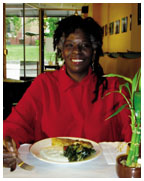|
Web Exclusives: Alumni Spotlight March 23, 2005
Rice,
rice, and more rice Can rice help revive a neighborhood? Valerie Erwin ’79 thinks so. When Erwin, a seasoned chef, decided to open a restaurant in her native Philadelphia two years ago, she didn’t look to the city’s tony Center City neighborhood. Instead, Erwin turned to her own Germantown neighborhood, a few miles from the North Philadelphia home where she grew up. Like many once-bustling urban business districts in the Northeast’s older cities, Germantown has seen a number of business owners, residents, and customers move to the suburbs and the malls over the years, leaving those who stayed to deal with empty storefronts and increasing crime. But with her Geechee Girl Rice Café, Erwin hopes to help change how people think of the area and to help spark revitalization. “I think there are few kinds of businesses that can change someone’s perception of an area, and a restaurant is one of those,” says Erwin, the president of the Germantown Business Association and a politics major at Princeton. Erwin’s menu centers around rice. With every dish, she serves one of four types: jasmine, a Thai white rice; brown rice; wild rice; or Carolina Gold, a long-grain white rice. She serves the rice with savory Southern dishes, such as low-country shrimp, and gumbo — the café’s most popular dish — made with chicken, sausage, shrimp, and okra. The name Geechee Girl comes from her parents’ roots in Georgia and South Carolina. Geechee is a generic term for the descendants of enslaved Africans from Africa’s West Coast, also known as the Rice Coast, who were brought to Georgia and Florida for their rice-cultivating skills. Erwin and her four sisters grew up eating lots of rice. “We had rice with everything except spaghetti,” jokes Erwin. Geechee Girl Rice Café is one sign of growth in Erwin’s
neighborhood. She’s also encouraged to see other signs of
improvement: Long-vacant houses are being bought and rehabbed, housing
prices are going up, and two new restaurants have opened, she says.
But Erwin knows revitalization will not be a simple or quick process.
“You have to have a whole lot of change before you see an
impact,” she says. By Argelio R. Dumenigo Argelio R. Dumenigo is a writer and editor in Philadelphia.
|
||

